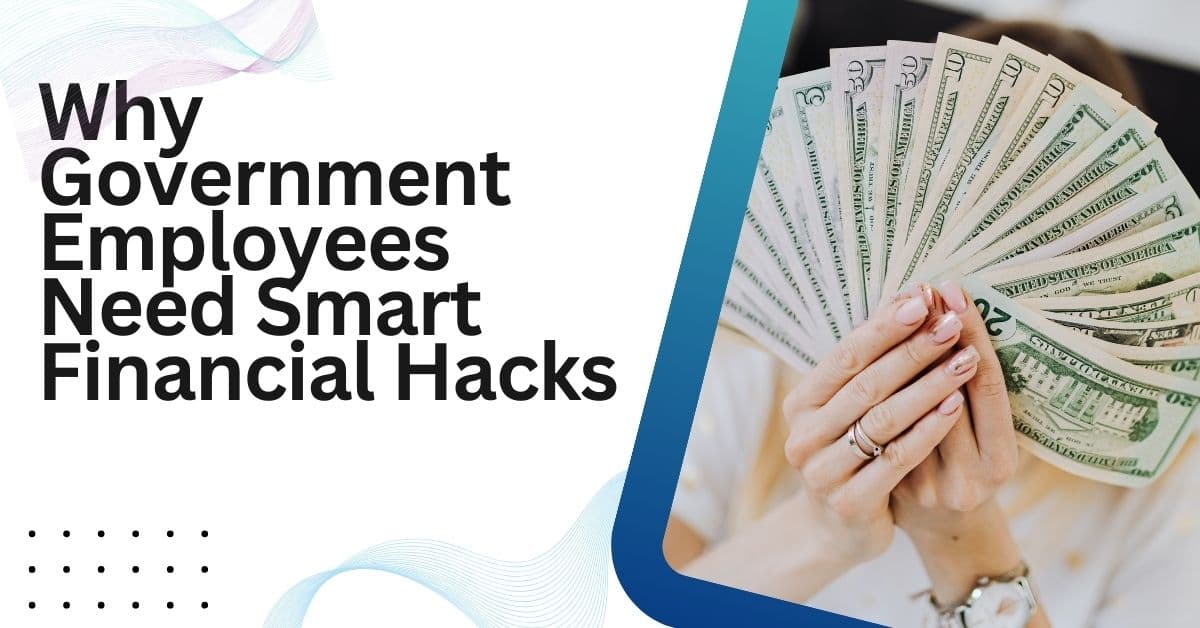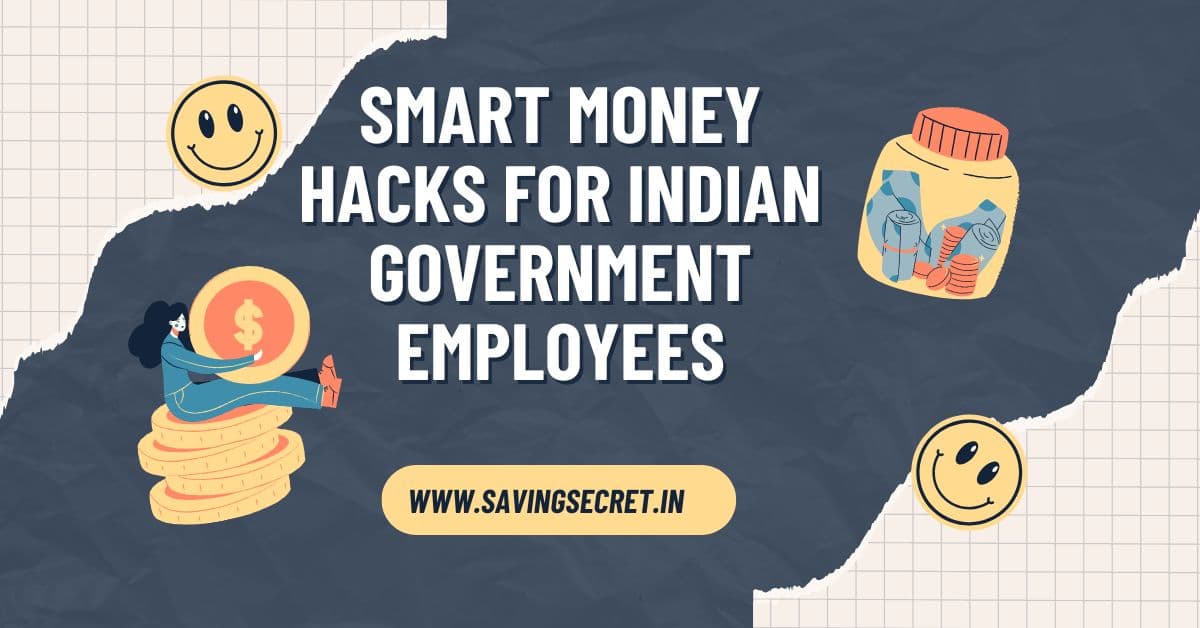Smart Money Hacks for Indian Government Employees: Government positions in India are connected with stability, with benefits such as pensions, allowances, and work security. According to Ministry of Personnel projections, there would be more than 50 lakh central and state government workers by 2025, making up a sizeable portion of the workforce. Nevertheless, many people find it difficult to optimise their income, invest wisely, or make long-term plans, even with stable wages. This is when smart money hacks—easy, doable methods to increase your income, accumulate wealth, and safeguard your financial future—come in handy. Whether you work as a clerk in Gujarat, a teacher in Kerala, or a railway worker in Delhi.
Why Government Employees Need Smart Financial Hacks
Fixed salary, Dearness Allowance (DA), House Rent Allowance (HRA), and post-retirement pensions (under NPS or OPS) are among the special financial perks available to government employees. These benefits, however, may be undermined by lifestyle creep, family obligations, and growing inflation (5–6% in 2025). The following explains why clever money hacks are crucial:

- Stable Income: If you know how, predictable pay cheques make saving and budgeting simpler.
- Benefits Optimisation: You may save money by leveraging loans, medical benefits, and HRA.
- Pension Planning: For a good retirement, proactive management of NPS or OPS is necessary.
- Family Objectives: Strategic planning is necessary for homes, marriages, and education.
- Inflation Protection: Hacks fill the gap when wages fall short of growing expenses.
These methods enable workers to flourish rather than merely survive, especially as India’s government employment expands and financial literacy rises.
A Comprehensive Guide on Smart Money Hacks for Indian Government Workers
Are you prepared to take charge of your money? This is a comprehensive guide on prudent money management for government employees:

Hack 1: Optimise Your Pay Structure
- Recognise the components: transport allowance (TA), DA, HRA, and basic salary.
- Claim HRA: Provide evidence that you pay rent in order to lower your taxable income (for example, ₹50,000 tax-free HRA for ₹10 lakh salary annually).
- Section 80C: To save money on taxes, invest ₹1.5 lakh in PPF, ELSS, or EPF (up to ₹46,800 at 30% slab).
- Take action: By April 2025, speak with your HR department for tax-efficient wage restructuring.
Hack 2: Make Use of Government Advantages
- Medical Compensation: You can claim up to ₹15,000 annually for non-taxable medical expenditures.
- Use the Leave Travel Allowance (LTA) twice every four years for family vacations; for example, ₹20,000 tax-free for a trip to Kashmir.
- Take advantage of low-interest loans for homes or cars (6-8% vs. 10-12% market rates).
- Take action: Submit LTA claims for travels in FY 2025–2026 by December 2025.
Hack 3: Use the 50-30-20 Rule when creating a budget
- Rent (₹10,000), food (₹5,000), and utilities (₹2,000) equal ₹17,000, which is 50% of needs.
- 30% Wants: ₹5,000 for amusement (₹2,000) and dining (₹3,000).
- 20% Savings: Emergency fund (₹2,000) minus investments (₹4,000) equals ₹6,000.
- For instance, a monthly income of ₹28,000 is ideal.
- Take action: Utilise a notebook or app such as Moneycontrol to begin creating a budget on April 1, 2025.
Hack 4: Increase Your Provident Fund (PF) Contributions
- Employer-matched EPF contributions of 12% of base pay yield around 8% tax-free interest.
- Increase contributions to Voluntary Provident Fund (VPF) to 100% of the base amount, such as an additional ₹5,000 per month.
- Benefit: At 8%, ₹1 lakh annually in VPF increases to ₹15 lakh over 15 years.
- Take action: By May 2025, choose VPF through your payroll.
Hack 5: Launch a Growth SIP
- Why: Compared to FDs (5-7%), equity mutual funds (10-15% returns) outperform inflation.
- How: ₹5,000 each month in large-cap funds through Groww or Zerodha, or ELSS (tax-saving) funds.
- For instance, ₹50 lakh is equal to ₹5,000 a month at 12% for 20 years.
- Take action: To receive tax advantages for FY 2025–2026, set up a SIP by April 15, 2025.
Hack 6: Create an Emergency Savings Account
- The target is six months’ worth of spending (for example, ₹1,50,000 for ₹25,000 each month).
- How: Put ₹2,000 a month into a liquid fund or savings account with a 6–7% yield.
- Why: Provides coverage for family needs, medical crises, and career changes.
- Take action: By April 10, 2025, open a different account.
Hack 7: Reduce Everyday Costs Cleverly
- Transportation: Save 500 per month by carpooling or using government bus passes.
- Save ₹1,000 a month by cooking at home instead of using a cafeteria.
- Share OTT subscriptions (e.g., ₹200/month vs. ₹500).
- Take action: Cut ₹2,000 and track spending for a week beginning April 1, 2025.
Hack 8: Utilise the National Pension System (NPS) for Retirement
- Section 80CCD(1B) allows for an additional deduction of ₹50,000.
- Returns: 8–12% (combination of financing and equity).
- For instance, a pension corpus of ₹38 lakh is equal to ₹5,000 a month for 20 years at 10%.
- By June 2025, take action by enrolling or increasing your NPS contribution.
Hack 9: Make Plans for Holidays
- Why: Spending is increased at family gatherings, Diwali, or Holi.
- How: Save ₹1,000 a month starting in April so that you have ₹8,000 ready for November.
- Steer clear of: Credit card debt with 36% interest.
- Take action: By April 5, 2025, establish a joyful fund.
Hack 10: Develop Your Skills to Earn More Money
- Why: Salary stagnation calls for an increase.
- How: Online courses through Coursera or Udemy (e.g., ₹5,000 for data analysis).
- Make: ₹10,000 a month instructing or working as a freelancer.
- Take action: Redirect wages to savings and enrol in a degree by May 2025.
Money Hacks Advantages for Government Workers

- Tax Savings: ₹50,000 to ₹70,000 year through HRA, 80C, and 80CCD.
- Wealth Growth: ₹5 lakh from PF and SIPs in ten years.
- Security: Pensions and emergency savings for comfort.
- Flexibility: Additional cash for personal or family objectives.
- Efficiency: Make the most of current advantages without putting in more work.
Examples from Real Life
The Retirement Plan of Ramesh
Ramesh, a 40-year-old Kolkata-based railway clerk who makes ₹40,000 a month:
- HRA: tax-free ₹8,000.
- VPF: ₹5,000 per month.
- SIP: ₹5,000 in ELSS every month.
- built ₹20 lakh in 15 years while saving ₹50,000 in taxes.
The Family Fund of Sunita
A 35-year-old Bhopal teacher named Sunita makes ₹30,000 a month:
- EPF: ₹3,600 per month.
- NPS: ₹2,000 per month.
- Monthly emergency fund: ₹2,000.
- In five years, she saved ₹1,50,000 for her daughter’s schooling.
The Travel Trick of Vikram
Vikram, a 28-year-old Hyderabadi postal worker who makes ₹25,000 per month:
LTA: tax-free journey for ₹15,000.
Reduce monthly food expenses by ₹1,000.
SIP: ₹3,000 per month.
In two years, a ₹50,000 vacation to Goa was financed.
Smart Money Tips for Government Employees
- Make Use of All Allowances: Don’t underutilise your medical, TA, or HRA benefits.
- Avoid Loans: Steer clear of loans by using government rates instead of private ones (12% vs. 18%).
- Digital tools: include ClearTax for tax filing and PhonePe for monitoring.
- A side business: Sell crafts or teach online for an additional ₹5,000 each month.
- Festive Savings: Enjoy festive discounts by purchasing during deals, such as the Amazon Great Indian Festival.
- Family Plan: Discuss strategies for shared objectives with your spouse.
- Keep Up: Look for tax adjustments or DA rises in the 2025 budget.
Typical Problems and Their Solutions
- Problem: DA hikes combined with lifestyle creep.
Solution: The answer is to put 50% of each raise—for example, ₹2,000 per month—into SIPs. - Problem: Family demands are a challenge.
Solution: Set aside ₹2,000 every month for emergencies and presents. - Problem: Time limits are a challenge.
Solution: Payroll-based SIP and PF automation—10 minutes each month. - Problem: Fear of investing is the challenge.
Solution: Investigate SIPs after starting with PPF or FDs (₹1,000/month). - Problem: NPS vs. OPS pension misunderstanding.
Solution: Use online NPS calculators or speak with HR.
The Reasons Government Workers Require These Hacks
Although the government sector in India provides unparalleled stability, wages frequently increase more slowly than their private sector counterparts. With 50 lakh workers and yearly pay of ₹10 lakh crore (2025 estimations), even minor hacks can unleash enormous potential:
- Digital Advantage: Money management is made easier with UPI (14.4 billion transactions, February 2025).
- Benefits of the policy: PF, LTA, and HRA are automatic savings options.
- Longevity: Long-term planning pays handsomely when jobs are steady.
The perks of your employment become a financial superpower thanks to these methods.
Resources and Tools
- Apps: Groww (SIPs), NPS (pension), and Walnut (expense monitoring).
- Websites: AMFI (mutual funds) and Income Tax India (tax regulations).
- Books: “The Richest Man in Babylon” (contemporary financial advice).
- Groups: Reddit or WhatsApp forums for government employees.
Get Started on Your Smart Money Adventure Now!
Now take control of your finances:
- You have until April 1, 2025, to review your payslip.
- Establish a VPF or SIP of ₹2,000 before April 15, 2025.
- Make an HRA or LTA claim for FY 2025–2026.
You are a wealth creator as well as an employee. To promote the smart money revolution, share this guide with your family, friends, and co-workers. Any employee of the Indian government might become financially proficient with these tips!
How to Use PhonePay Smart Savings for Daily Goals
Saving Money During Medical Emergencies in India: A Practical Guide
Money in Control: Best Apps to Track Your Expenses
Financial Planning Tips for Income from Household Property
